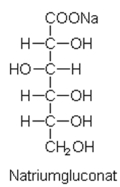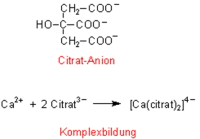Komplexbildner/Chelatbildner/Enthärter
Komplexbildner sind Verbindungen, die mit Metallionen oder -atomen Verbindungen (sogenannte Komplexe) eingehen können, um unerwünschte chemische Eigenschaften zu maskieren.
Mengenmäßig die größte Bedeutung hat die Entfernung von Ca
2+ Ionen aus diversen Medien, wo genau diese Ca
2+ Ionen störend wirken - man spricht hier von Enthärtung. Enthärtung bedeutet also die Entfernung von härtebildenen (Ca
2+, Mg
2+) Ionen aus Wasser oder auch aus Schmutz.
Komplex- oder Chelatbildner entfernen ebenfalls störende Ionen aus Wasser oder Schmutz, jedoch binden Komplexbildner neben Ca
2+ und Mg
2+ Ionen auch (je nach Art ihres Aufbaues oder ihrer Zusammensetzung) eine ganze Reihe anderer störenden Metall-Ionen wie Fe, Zn, usw.
Definition der Wasserhärte:
1 °dH = 0,18 mmol/l Erdalkalien. Das sind 7,1 mg Ca
2+- oder 4,3 mg Mg
2+-Ionen pro Liter Wasser.
| Härtebereiche |
Wassereigenschaft |
°dH |
| 1 |
Weiches Wasser |
0 - 7 |
| 2 |
Mittelhartes Wasser |
8 - 14 |
| 3 |
Hartes Wasser |
15 - 21 |
| 4 |
Sehr hartes Wasser |
> 21 |
Einfluss von Metallionen während des Reinigungs- bzw. Waschvorganges
Wirkung auf Tenside/Netzmittel (durch hartes Wasser):
Tenside bzw. Netzmittel werden in ihrer grenz- bzw. oberflächenaktiven Wirkung durch den Einfluss und die Anwesenheit von härtebildenden Ionen beeinträchtigt. So bilden Seifen mit Calcium-Ionen schwer lösliche Kalkseifen, welche als Rückstände ausfallen:

Kalkseifen haben keine tensidischen Eigenschaften und verringern dadurch die Waschleistung extrem.
Wirkung von Metall-Ionen im Schmutz:
Da Metall-Ionen die Haftung von Schmutz an der Oberfläche verstärken sowie auch den Zusammenhalt von Schmutzpartikeln, sollten diese aus dem jeweiligen System nach Möglichkeit entfernt werden. Verschmutzungen sind wesentlich besser entfernbar, wenn ihnen Metall-Ionen entzogen werden.
Bildung von Gips- und Kalkablagerungen:
Mit Sulfat-Ionen bilden Ca-Ionen schwerlöslichen Gips:

Bei Temperaturen über 60°C bildet sich aus wasserlöslichem Calciumhydrogencarbonat schwerlösliches Calciumcarbonat (Kalk):

Die Folge in beiden Fällen sind schwer entfernbare Ablagerungen, welche Geräte schädigen und die Waschkraft sehr beeinträchtigen.
Zerfall von Bleichmitteln:
Die Bleichwirkung diverser Bleichmittel wird durch die Anwesenheit von Schwermetall-Ionen zunichte gemacht, da diese den Zerfall von Bleichmitteln katalysieren.
Wirkungsweise von Enthärtern bzw. Komplexbildnern
Durch den Einsatz von Komplexbildnern in Waschflotten werden im Wesentlichen folgende Wirkungen erzielt:
- Verhinderung/Unterbindung von Gips- und Kalkablagerungen
- Dispergierung von Schmutz/Schmutzpartikeln
- Stabilisierung von Bleichmitteln
- Verbesserung des Quellvermögens von organischem Schmutz
Unterschieden werden folgende drei Wirkmechanismen:
- Komplexierung
- Fällung
- Ionentausch
Wirkungsweise diverser komplexbildenden Substanzen und Produkten
| Na-triphosphat |
Wirkt komplexierend. Schnelle Bindung von Ca-Ionen.
Wirkt dispergierend und unterstützt dadurch den Reinigungsvorgang.
Ungiftig. |
Na5P3O10 |
| Phosphonate |
Vergleichbare Wirkung und Eigenschaften wie bei Na-triphosphat. |
 |
| Polycarboxylate |
Wasserlösliche Ionentauscher. Polycarboxylate entfalten ebenfalls eine sehr rasche Bindung, Wirkung bei der Enthärtung.
Während der Enthärtung/Komplexierung werden je zwei Na-Ionen durch ein Ca- oder Mg-Ion ersetzt. |
 |
| Gluconate |
Ein Enthärter ohne Düngeeffekt.
Biologisch abbaubar.
Aus nachwachsenden Rohstoffen, da Gluconate aus Glucose hergestellt werden. |
 |
| EDTA (Ethylendiamintetraacetat) |
Schnelle komplexierende Wirkung.
Bildet sehr stabile Ca-Komplexe und auch Komplexe mit weiteren Schwermetall-Ionen.
Nachteil: EDTA wird nur langsam abgebaut. |
 |
| Citronensäure |
Wirkt wasserenthärtend; bei höheren Temperaturen jedoch etwas schlechtere Wirkung.
Biologisch abbaubar. |
 |
| Seife |
Härtebildende Ionen werden als Kalkseifen gebunden.
Biologisch abbaubar. |
---- |
| Zeolith A |
Bestandteil der meisten pulverförmigen Waschmittel.
Wirkung ähnlich wie bei Polycarboxylaten.
Der Nachteil liegt im relativ langsamen Einsetzen der Wirkung.
Nach heutigem Wissenstand der umweltverträglichste Enthärter. |
x Na2O · y Al2O3 · z SiO2. |
Kapazitäten der diversen Komplexbildner
Ist naturgemäß abhängig von der Art des eingesetzten Enthärters, der Temperatur und der jeweiligen Wasserhärte:
| Bindungskapazitäten von Enthärtern in mg Ca2+-Ionen pro 1 g Enthärter |
| Enthärter / Temperatur: |
20 °C |
90 °C |
| Phosphonat |
281 |
270 |
| NTA |
204 |
144 |
| Polycarboxylat |
200 |
170 |
| EDTA |
156 |
110 |
| Triphosphat |
113 |
81 |
| Zeolith |
- |
» 81 (bei 60 °C) |
| Citrat |
139 |
21 |
| Gluconat |
90 |
- |
| Seife |
» 65 |
- |
Anwendungsgebiete von Komplexbildnern in der (chemischen) Industrie
| Oberflächenveredelung, Galvanik, Elektrochemie; Elektronikindustrie |
Verhinderung bzw. Rückgang von Metall/Metallsalzausfällungen in Bädern.
Verhinderung von Verunreinigungen durch Fremdmetall-Ionen in Behandlungsbädern.
Verbesserung der Qualität der Endprodukte |
| Textil- und Lederindustrie |
Stabilisierung von Peroxid-Bleichlaugen.
Beseitigung von Spurenmetallen zum Schutz von Farbstoffen.
Reduzierung von Farbtonveränderungen.
Verhinderung von metallhaltigen Flecken.
Vorbeugung vor Kalk- und Kesselsteinbildung. |
| Papier- und Zellstoffindustrie |
Bindung nicht komplexierter Metall-Ionen, welche den Abbau von Wasserstoffperoxid und Ozon katalysieren.
Um Haltbarkeit und Effizienz von Bleichmitteln zu steigern.
Verbesserung der Effektivität von Bleichmitteln. |
| Chemische Industrie |
In den unterschiedlichsten Industrien und Herstellungsprozessen haben Metall-Ionen negative Einflüsse auf die Produktion und die Qualität der Endprodukte. So kommen Komplexbildner zum Einsatz in:
- Polymerisation
- Synthese von Polyestern und Polyethern
- Produktion von anorganischen und organischen Peroxiden
- Produktion diverser anorganischer Produkte
- Kosmetikindustrie
- Öl- und Gasindustrie
- Produktion von Farbstoffen
- Produktion von Druckfarben
- Etc.
|
| Reinigungsmittel/Waschmittel |
Wasserenthärtung.
Schmutzfänger.
Vorbeugung von Gips- und Kalkablagerungen.
Verstärkung der Reinigungskraft. |
Portfolio der Komplexbilder der Donauchem GmbH
Komplexbildner der Donauchem GmbH werden unter dem Markennamen
DonPlex gehandelt. Unser Portfolio umfasst Produkte aus den Produktgruppen der:
- Phosphate/Polyphosphate
- Citronensäure/Citrate
- Gluconate
- EDTA
- MGDA
- PBTC
- Phosphonsäuren/Phosphonate
- Polyacrylate
Spezialprodukte auf Anfrage.
Für nähere Informationen stehen wir gerne mit technischen und chemischen Beratungen zur Verfügung.
 www.donauchem.at
www.donauchem.at